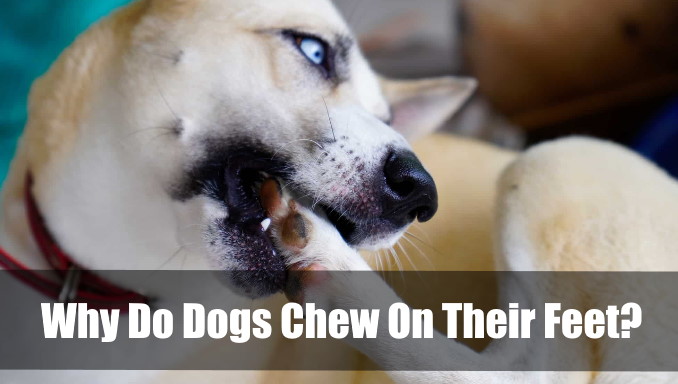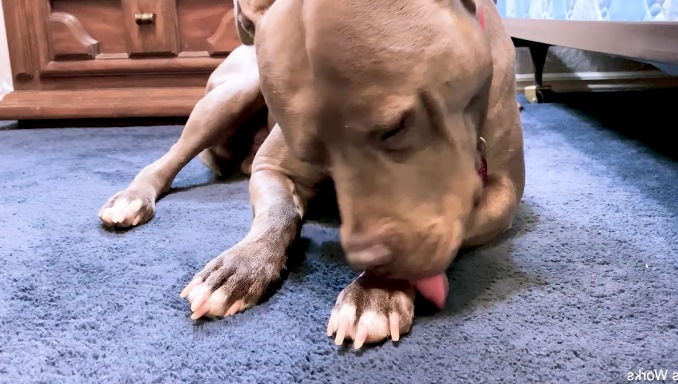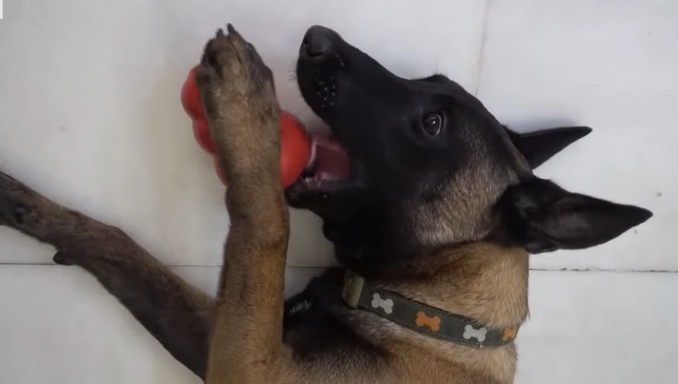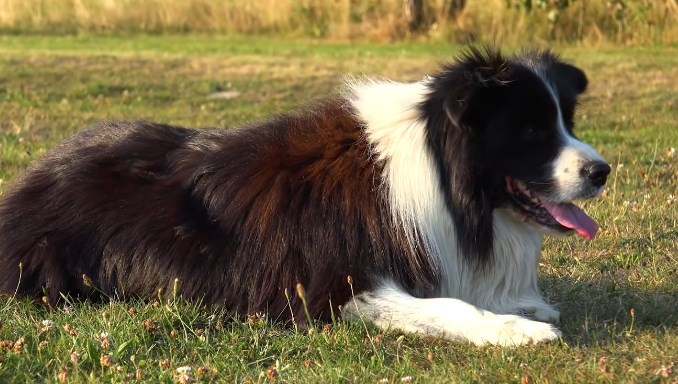Why Do Dogs Chew On Their Feet?
Dogs are known to chew on things they shouldn’t, and feet seem to be a popular choice. So why do dogs chew on their feet? There could be many reasons, but some of the most common causes include boredom, anxiety, or irritation. If your dog is chewing on his feet, it’s important to figure out the root of the problem and address it accordingly. Ignoring the issue could lead to further behavioral problems down the road.
If you’ve ever owned a dog, you’re likely familiar with the habit of dogs chewing on their feet. This behavior can be puzzling to owners, but there are several reasons why dogs might chew on their feet. In this blog post, we’ll explore some of the most common reasons for why do dogs chew on their feet and offer tips on how to help your dog stop chewing on his or her feet.
Why Do Dogs Chew on Their Feet?
Why do dogs chew on their feet? There are many reasons for this but we will divide them all into 2 parts: Mental reasons and Reasons related to bodily harm.
Mental reasons
There are several reasons why dogs might chew on their feet, including boredom, anxiety, or irritation. If your dog is chewing on his feet, it’s important to figure out the root of the problem and address it accordingly. Ignoring the issue could lead to further behavioral problems down the road.
Boredom
One of the most common reasons for dogs to chew on their feet is boredom. If your dog isn’t getting enough exercise or mental stimulation, he may start chewing on his feet out of boredom. This is especially common in puppies and young dogs who have a lot of energy to burn.
Anxiety
Another common reason for dogs to chew on their feet is anxiety. Dogs may start chewing on their feet when they’re feeling anxious or stressed. This may be due to Separation Anxiety, a fear of Thunderstorms, or other anxieties. If your dog is chewing on his feet out of anxiety, it’s important to talk to your veterinarian or a behaviorist to find ways to help your dog cope with his anxiety.
Irritation
Dogs may also start chewing on their feet if they’re experiencing some sort of irritation. This could be due to allergies, dry skin, hot spots, or other skin conditions. If your dog is chewing on his feet because of an irritation, it’s important to talk to your veterinarian to find out what’s causing the irritation and how to treat it.
If your dog is chewing on his feet, it’s important to figure out the root of the problem so that you can address it accordingly. Ignoring the issue could lead to further behavioral problems down the road. If you’re not sure what’s causing your dog’s chewing behavior, it’s best to consult with a veterinarian or animal behaviorist. They’ll be able to help you determine the cause of the problem and recommend a course of treatment.
Reasons related to bodily harm
In addition to the above reasons, why do dogs chew on their feet is also answered through the following factors:
Dog is injured
There are also some reasons why dogs might start chewing on their feet that are related to bodily harm. If your dog has injured his foot or is experiencing pain in his foot, he may start chewing on it as a way to try to relieve the pain. This is especially common if your dog has a broken toe or nail, arthritis, or another type of joint pain. If your dog is chewing on his feet because of an injury or pain, it’s important to talk to your veterinarian so that you can get him the treatment he needs.
Dogs may also start chewing on their feet if they’re experiencing some sort of irritation. This could be due to allergies, dry skin, hot spots, or other skin conditions. If your dog is chewing on his feet because of an irritation, it’s important to talk to your veterinarian to find out what’s causing the irritation and how to treat it.
Allergy
Relief is one popular reason that dogs lick and chew their feet. If your dog’s feet are itchy, he may be trying to relieve the irritation by licking and chewing them. Dogs can develop allergies to just about anything, including the ingredients in their food, pollen, grass, and even their own shampoo. If you think your dog’s allergies might be the cause of his foot-licking, talk to your vet about changing his diet or trying a different shampoo.
Dog skin is dry
Dogs may also start chewing on their feet if they’re experiencing some sort of irritation. This could be due to allergies, dry skin, hot spots, or other skin conditions. If your dog is chewing on his feet because of an irritation, it’s important to talk to your veterinarian to find out what’s causing the irritation and how to treat it.
Dogs may start licking and chewing their feet if the skin on their feet is dry. This is most common in the winter when the air is dry and can cause the skin on your dog’s feet to become dry and cracked. If your dog’s feet are dry, you can try using a moisturizing lotion or balm to help relieve the dryness. You can also try giving your dog a footbath with warm water and soothing oatmeal to help relieve the itchiness.
Hot spots
Dogs may also start chewing on their feet if they’re experiencing some sort of irritation. This could be due to allergies, dry skin, hot spots, or other skin conditions. If your dog is chewing on his feet because of an irritation, it’s important to talk to your veterinarian to find out what’s causing the irritation and how to treat it.
Hot spots are a common skin condition that can cause dogs to lick and chew their feet. Hot spots are usually caused by an underlying allergy or infection and can be very painful for your dog. If you think your dog has a hot spot, it’s important to take him to the vet so that he can be treated.
Parasites
When dogs are infected with parasites such as fleas, ticks, and lice, their feet can be extremely itchy and uncomfortable. Chewing on their feet is one way dogs try to relieve the itchiness and get some relief.
If you think your dog has a parasite infection, it’s important to take him to the vet so that he can be treated.
How to Stop Your Dog from Chewing on His Feet
You already know why do dogs chew on their feet, here’s how you can stop it.
Wear a Wear an anti-licking collar for your dog
The use of an anti-licking collar can help to effectively stop your dog from chewing on his feet. This type of collar is designed to prevent your dog from being able to reach his feet with his mouth. It is important to ensure that the collar fits properly and is not too tight, as this could cause discomfort for your dog.
Choose the right food and treats
It is possible that the dog is allergic to food, so there is a behavior of chewing on the leg, so please review the dog’s daily diet and food. Feed your dog high-quality food. Contains a balanced formula of vitamins and minerals and fatty acids. Do not pamper the dog with greasy, fried food. Because their bodies are extremely sensitive to this type of food.
There are certain types of food and treats that can help to deter your dog from chewing on his feet. For example, foods that contain natural anti-inflammatory properties such as turmeric or omega-3 fatty acids can help to reduce the urge to chew. You may also want to try using dog chews or toys that are designed to discourage chewing.
Store chemicals out of reach of dogs
Avoid leaving chemicals in places where your dog can go, stowed away in a cupboard. With their curious nature, they may come into contact with chemicals, chemicals that can hurt or cause allergies to dogs.
Use dog shower gel and moisturizer
Choose and use dog shampoo products with moisturizing ingredients so that the dog’s skin does not dry out. In winter, the weather is dry, it is recommended to use it in combination with moisturizer to keep the dog’s skin healthy and elastic.
After the bath, apply dog shower gel and moisturizer to the area where your dog licks his feet. This will help to keep the area clean and free of any irritants that could trigger the urge to chew. You can also try using a dog-specific lotion or balm to soothe the skin and discourage licking.
Buy toys and play with dogs
Buy your dog some toys, this will help the dog not be bored and have something to do. At the same time, it helps the dog’s teeth to be strong and not easy to fall out.
Take the dog out for a walk. Make sure you take your dog for a walk every day. This will help to tire them out and hopefully stop them from chewing on their feet as much.
If you have tried all of these things and your dog is still chewing on his feet, then you may want to consult a veterinarian to rule out any underlying health conditions that could be causing the problem.
Spend more time with your dog
If you spend more time with your dog, it will reduce the likelihood of him chewing on his feet. Dogs that are left alone for long periods of time are often the ones that develop this bad habit. Try to set aside some time each day to play with your dog or take them for a walk. This will help to keep them happy and occupied, and less likely to chew on their feet.
Tips to Stop Your Dog from Chewing on His Feet
If your dog is chewing on his feet, there are several things you can do to help him stop. Here are a few tips:
- Provide plenty of exercise and mental stimulation: If your dog is bored, he’s more likely to start chewing on his feet. Make sure you’re providing enough exercise and mental stimulation to keep your dog happy and occupied.
- Talk to your veterinarian or a behaviorist: If your dog is anxious or stressed, he may start chewing on his feet as a way to cope. Talk to your veterinarian or a behaviorist to find ways to help your dog cope with his anxiety.
- Treat any skin conditions: If your dog is chewing on his feet because of an irritation, it’s important to talk to your veterinarian to find out what’s causing the irritation and how to treat it.
- Use a deterrent: There are several commercial products available that can help deter your dog from chewing on his feet. Talk to your veterinarian about which product may be right for your dog.
- Provide chew toys: If your dog is chewing on his feet out of boredom, provide him with plenty of chew toys to keep him occupied.
With a little patience and effort, you can help your dog stop chewing on his feet. If you’re having trouble, talk to your veterinarian or a behaviorist for more advice. As you can see why do dogs chew on their feet depends on many reasons, and depending on that we can find a way to get them to stop this behavior.
Should you be too worried about this behavior of your dog?
If your dog is chewing on his feet, it’s important to take him to the veterinarian to rule out any medical conditions that may be causing the problem. If there’s no underlying medical condition, you can work on breaking the habit by using some of the tips above. However, if your dog is anxious or stressed, you may need to seek help from a behaviorist to find ways to help your dog cope. Ultimately, if you’re patient and consistent, you can help your dog stop chewing on his feet.
Why Do Dogs Chew on Their Paws?
There are a number of reasons why your dog may be chewing on their paws, including boredom, anxiety, stress, allergies, and more. If you notice your dog excessively chewing on their paws, it’s important to seek professional help to determine the underlying cause and get them the treatment they need. In the meantime, there are a few things you can do to help your dog stop chewing on their paws, including providing them with chew toys, keeping their nails trimmed, and using a pet-safe Paw Balm to help soothe any irritation.
If you’re wondering why your dog is chewing on their paw, it’s important to first rule out any medical causes. Allergies, infection, and even arthritis can all cause your dog to chew on their paws as a way to relieve discomfort. If you suspect your dog is chewing on their paw for medical reasons, it’s important to take them to the vet for an evaluation.
Other Things to Consider of Why do Dogs Chew on Their Feet
Dogs have many other behaviors that we may find confusing, there are many other questions like why do dogs chew on their feet that we can ask our friends.
Other behaviors of dogs
There are many different dog behaviors that can be considered problematic or even dangerous. Some of the most common include barking, chewing, digging, jumping, and biting. In many cases, these behaviors are simply nuisances that can be annoying to owners. However, in other cases, these behaviors can cause serious damage to property or even harm people.
There are a number of different reasons why dogs may exhibit these kinds of behaviors. In some cases, it may be due to boredom or frustration. Dogs that are not given enough attention or exercise may start to act out in order to get attention from their owners. Additionally, some dogs may have separation anxiety and become stressed when left alone. This can lead to destructive behaviors like chewing or digging.
In other cases, dog behavior problems may be due to fear or aggression. Dogs that are afraid may lash out in order to protect themselves, while aggressive dogs may attack people or other animals. This can pose a serious threat to public safety.
Dog behaviors – Causes and Solution
There are a number of reasons why your dog may be behaving in an undesirable way. It could be due to boredom, lack of exercise, fear, anxiety, or even hunger. Whatever the reason, there are a number of solutions that you can try in order to help your dog feel better and behave correctly.
If your dog is behaving badly due to boredom, try adding some new toys or activities into their life. This could include chew toys, Kongs stuffed with treats, interactive dog toys, or even just more walks and playtime outside.
If your dog isn’t getting enough exercise, this could be the root of their problem behavior. Dogs are natural explorers and love to run and play, so make sure that they are getting enough of this in their life. Daily walks, runs, or even just some time in the backyard playing fetch can help burn off excess energy and lead to better behavior.
If your dog is behaving out of fear or anxiety, there are a number of solutions that can help. This could include things like dog anxiety medication, dog pheromone diffusers, or even just training and behavior modification. Talk to your veterinarian about what options might be best for your dog’s specific needs.
If your dog is behaving badly due to hunger, the solution is simple – feed them! Make sure that they are getting enough food each day, and that their food is high quality. If you are unsure about how much to feed your dog, talk to your veterinarian for guidance.
No matter what the reason for your dog’s bad behavior, there is a solution out there. Talk to your veterinarian, do some research, and try different things until you find something that works for you and your dog. With a little patience and effort, you can help your dog overcome their behavioral problems and live a happy life.
Things You May Not Know About Dogs
- Dogs are pack animals and love to be around other dogs and people. If you don’t provide your dog with enough socialization, they may become anxious or aggressive.
- Dogs are naturally curious and will sniff and investigate anything that catches their interest. This can lead to trouble if they get into things they’re not supposed to, so it’s important to keep an eye on them and provide them with plenty of toys and chew bones to keep them occupied.
- Dogs are very food-motivated and will often beg for food or snacks. This can be a problem if you’re trying to lose weight or watching your own intake, so be sure to give your dog their own food and treats instead of sharing your own.
- Dogs love to play and be active, so it’s important to provide them with plenty of opportunities to run and play. If you don’t have a yard or live in an apartment, there are still plenty of ways to keep your dog active, such as playing fetch indoors or going for walks around the neighborhood.
- Dogs are loyal and protective of their family and home, which is why they make such great guard dogs. However, this loyalty can also lead to separation anxiety if you’re away from your dog for too long. Be sure to give your dog plenty of attention and love when you’re home, and leave them with a favorite toy or treat when you have to go out.
Top 10 Fun Facts About Dogs:
Dogs are amazing creatures that have been by our side for centuries. They are loyal and loving companions that bring us joy, laughter, and unconditional love. But there are still so many things about dogs that we don’t know. Here are 10 fascinating facts about dogs that you may not know:
1. Dogs have a sense of time. Dogs are able to tell time, and they use this ability to pace themselves throughout the day. They know when it’s time to eat, time to play, and time to rest.
2. Dogs can dream. When dogs sleep, they often enter into a state of REM (rapid eye movement) sleep. This is the stage of sleep when humans dream, and it’s likely that dogs dream as well.
3. Dogs have a good memory. Dogs have an excellent memory, and they can remember things for a long time. This is why they can be trained to perform tricks, obey commands, and remember their way home.
4. Dogs can be left- or right-pawed. Just like humans, dogs can be either left- or right-pawed. In fact, about 40% of dogs are left-pawed, while the other 60% are right-pawed.
5. Dogs can sense emotions. Dogs are very attuned to the emotions of those around them. They can pick up on happiness, sadness, anger, and fear.
6. Dogs see in color. Contrary to popular belief, dogs do see in color. They just don’t see colors as vividly as humans do.
7. Dogs have a good sense of smell. Dogs have an incredible sense of smell, and they can use this sense to track down people or other animals. They can also be trained to sniff out drugs, bombs, and other hazardous materials.
8. Dogs sweat through their paws. Dogs don’t sweat through their fur like humans do. Instead, they sweat through the pads on their paws.
9. Dogs wag their tails to communicate. Dogs use tail wagging to communicate a variety of emotions, including happiness, excitement, fear, and anxiety.
10. Dogs are descended from wolves. Dogs are descendants of wolves, and they share a common ancestor with other canids like foxes and jackals.
FAQs of Why Do Dogs Chew on Their Feet
How can I keep my dog from getting bored?
Provide your dog with plenty of toys and chew bones to keep them occupied, and take them on walks or runs to help them stay active. You can also try teaching them tricks or playing games with them to help stimulate their mind.
What should I do if my dog is showing signs of separation anxiety?
If your dog is showing signs of separation anxiety, such as pacing, whining, or barking, try to provide them with plenty of attention and love when you’re home. You can also leave them with a favorite toy or treat to help keep them calm when you have to go out. If the problem persists, you may want to consult a veterinarian or animal behaviorist.
What are some common health problems that affect dogs?
Some common health problems that affect dogs include allergies, arthritis, cancer, diabetes, and heart disease. It’s important to take your dog to the vet regularly for check-ups and vaccinations to help prevent these problems.
How can I tell if my dog is sick?
If your dog is acting lethargic, has a loss of appetite, is vomiting or has diarrhea, these may be signs that something is wrong. It’s important to take them to the vet for a check-up if you notice any changes in their behavior or health.
Why Do Dogs Chew on Their Feet When It’s Hot Outside?
There are a few reasons why your dog may chew on their feet when it’s hot outside. One reason could be that your dog is trying to cool themselves off. Chewing on their feet helps circulate blood and allows them to cool down. Another reason could be that your dog is trying to relieve itchiness or discomfort. If their feet are hot and sweaty, they may be more prone to itchiness and irritation. Chewing can help soothe these symptoms. Lastly, some dogs simply enjoy the taste of their feet!
When should I take my dog to the vet?
You should take your dog to the vet at least once a year for a check-up and vaccinations. If you notice any changes in their behavior or health, it’s important to take them to the vet as soon as possible.
What are some common behavior problems in dogs?
Some common behavior problems in dogs include barking, biting, chewing, digging, and jumping. If you notice any of these behaviors in your dog, it’s important to train them so that they know it’s not acceptable. You may also want to consult a veterinarian or animal behaviorist for help.
How can I train my dog?
There are a number of ways to train your dog, including positive reinforcement, negative reinforcement, and clicker training. It’s important to find a method that works best for you and your dog, and to be consistent with the training. You may also want to consult a professional trainer for help.
Conclusion
Why do dogs chew on their feet? While the reasons why dogs chew on their feet are not fully understood, there are some potential explanations. Dogs may chew on their feet as a way to relieve boredom or stress, or because they are experiencing pain or discomfort.
If your dog is chewing on his feet excessively, it is important to take him to the veterinarian to rule out any health problems. Until more is known about this behavior, keep an eye on your pup and be prepared to intervene if he starts gnawing at his paws too much.
Thanks for reading!












